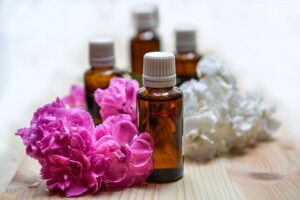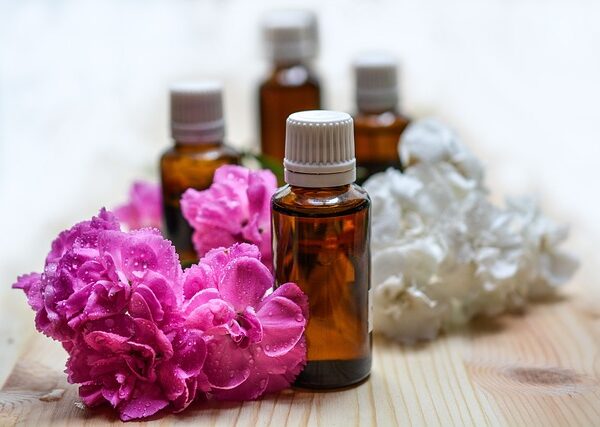Essential oils are highly concentrated plant extracts that are used for a variety of purposes, including aromatherapy, health, and beauty. They are extracted from various parts of plants, including leaves, flowers, stems, and roots. Essential oils have been used for thousands of years for their therapeutic properties and are still popular today.
The history of essential oils dates back to ancient times when they were used by the Egyptians, Greeks, and Romans for medicinal purposes. The first recorded use of essential oils was by the Egyptians who used them in their embalming process. The Greeks and Romans also used essential oils for medicinal purposes and as perfumes.
Essential oils are extracted through various methods such as steam distillation, cold pressing, and solvent extraction. Steam distillation is the most common method used to extract essential oils from plants. It involves heating the plant material with steam to release the essential oil which is then collected in a separate container.
Benefits of Essential Oils
 Aromatherapy benefits: Aromatherapy is the use of essential oils to promote physical and emotional well-being. Essential oils can be diffused into the air or applied topically to provide a range of benefits such as reducing stress and anxiety, improving sleep quality, and boosting mood.
Aromatherapy benefits: Aromatherapy is the use of essential oils to promote physical and emotional well-being. Essential oils can be diffused into the air or applied topically to provide a range of benefits such as reducing stress and anxiety, improving sleep quality, and boosting mood.
Health benefits: Essential oils have been shown to have a range of health benefits such as reducing inflammation, relieving pain, improving digestion, and boosting immunity. They can be used to treat a variety of health conditions such as headaches, menstrual cramps, and respiratory infections.
Beauty benefits: Essential oils can be added to skincare products such as lotions and creams to provide a range of beauty benefits such as reducing acne, improving skin tone and texture, and promoting hair growth.
Lavender: A Popular Essential Oil
Lavender essential oil is one of the most popular essential oils due to its calming properties. It is extracted from the flowers of the lavender plant and has a sweet, floral scent. Lavender essential oil is known for its ability to reduce stress and anxiety, promote relaxation, and improve sleep quality.
Lavender essential oil can be used in a variety of ways such as adding a few drops to a diffuser or bath, applying it topically to the skin, or using it in massage therapy. It is also commonly used in skincare products due to its ability to soothe and heal the skin.
In addition to its calming properties, lavender essential oil has been shown to have a range of health benefits such as reducing inflammation, relieving pain, and improving digestion. It can also be used to treat skin conditions such as eczema and psoriasis.
Lemon: A Versatile Essential Oil
Lemon essential oil is another popular essential oil due to its versatility. It is extracted from the peel of the lemon fruit and has a fresh, citrus scent. Lemon essential oil is known for its ability to uplift mood, improve focus and concentration, and boost energy levels.
Lemon essential oil can be used in a variety of ways such as adding a few drops to a diffuser or cleaning products, applying it topically to the skin, or using it in cooking. It is also commonly used in skincare products due to its ability to brighten and tone the skin.
In addition to its mood-boosting properties, lemon essential oil has been shown to have a range of health benefits such as reducing inflammation, relieving pain, and improving digestion. It can also be used as a natural disinfectant due to its antibacterial properties.
How Essential Oils Can Help You Heal
Essential oils can be used to treat a variety of health conditions such as headaches, menstrual cramps, and respiratory infections. They work by interacting with the body’s natural systems such as the nervous system and immune system.
Essential oils can be used in a variety of ways such as inhalation, topical application, and ingestion. Inhalation involves diffusing the essential oil into the air or inhaling it directly from the bottle. Topical application involves applying the essential oil directly to the skin, usually diluted with a carrier oil. Ingestion involves adding the essential oil to food or beverages.
It is important to note that essential oils should be used with caution and under the guidance of a healthcare professional. Some essential oils can cause skin irritation or allergic reactions, and some are not safe for ingestion.
Safety Considerations When Using Essential Oils
When using essential oils, it is important to take precautions to ensure safety. Essential oils should always be diluted with a carrier oil before applying topically to the skin. They should also be stored in a cool, dark place away from children and pets.
It is also important to properly dilute essential oils before ingesting them. Some essential oils are not safe for ingestion and can cause serious health problems if ingested in large amounts.
If you are pregnant or have a medical condition, it is important to consult with a healthcare professional before using essential oils. Some essential oils can interact with medications or exacerbate certain medical conditions.
Essential oils have been used for thousands of years for their therapeutic properties and are still popular today. They provide a range of benefits such as reducing stress and anxiety, improving sleep quality, and boosting mood.
Lavender and lemon are two popular essential oils due to their calming and mood-boosting properties. They can be used in a variety of ways such as adding them to a diffuser or skincare products.
When using essential oils, it is important to take precautions to ensure safety. Essential oils should always be properly diluted before use and stored in a cool, dark place away from children and pets. If you are pregnant or have a medical condition, it is important to consult with a healthcare professional before using essential oils.











